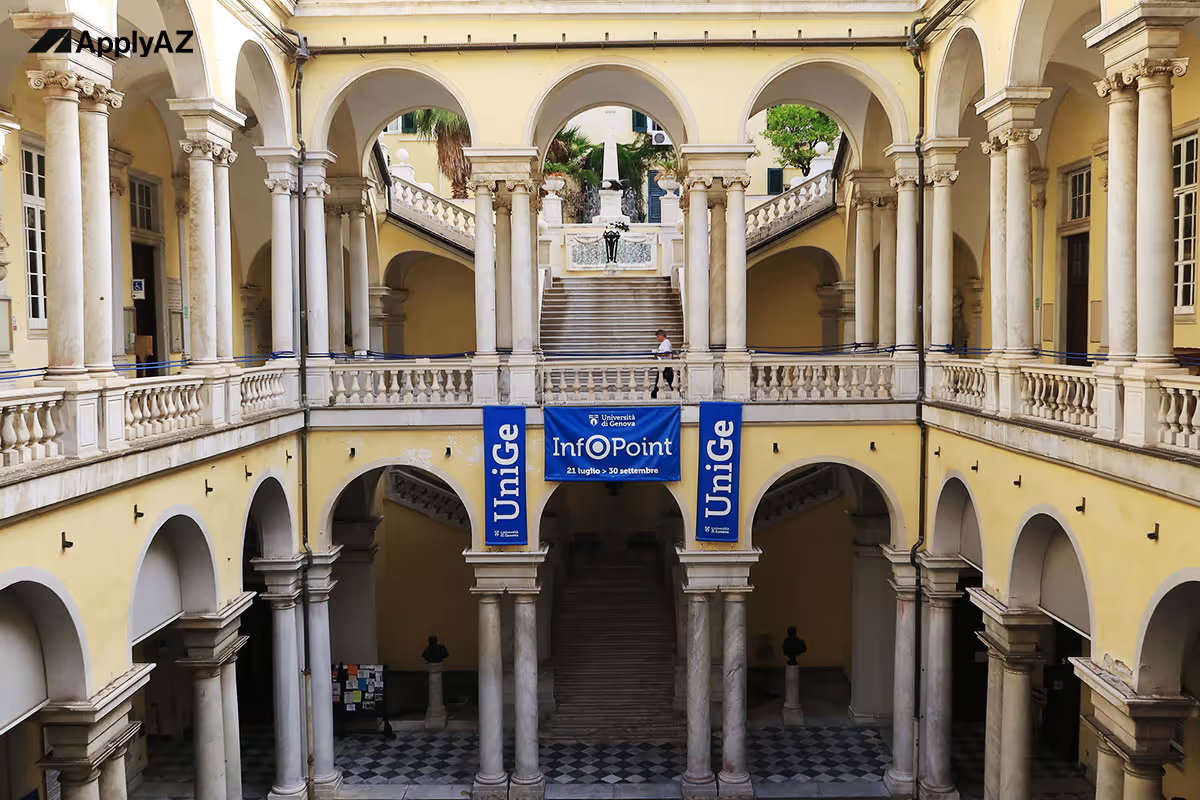Heading
Heading








University of Genoa
English‑taught programmes in Italy: why choose the University of Genoa
Founded in 1481 and consistently ranked among Europe’s leading maritime and engineering hubs, the University of Genoa offers more than 40 degree tracks taught partly or fully in English. This makes it one of the most versatile options for students seeking English‑taught programs in Italy while paying the regulated fees of public Italian universities. Incomes under specific thresholds can unlock the DSU grant, bringing total costs close to the levels often associated with tuition‑free universities Italy commentators mention. Key departments include naval architecture, robotics, computer science, biotechnology, and economics—each anchored by research centres that attract EU Horizon funding and private‑sector contracts.
Living and learning in a historic port city
Genoa stretches between mountains and sea, giving students a mild climate—winter averages 10 °C and summers hover around 28 °C. Shared flats in neighbourhoods like San Fruttuoso or Albaro cost roughly €300–€350 per month, and a €25 student travel pass covers buses, funiculars, and seaside trains. Cafeteria meals drop to €4 or even zero when the DSU grant applies. Cultural life blends Renaissance palaces, street‑art lanes, and open‑air concerts on the harbour. University sports clubs organise sailing, climbing, and coastal hikes, while language‑exchange cafés help you practise Italian after lectures.
Careers, internships, and industry links
Genoa is Europe’s busiest Mediterranean port and the core of Italy’s “Blue Economy.” Maritime giants, shipyards, and logistics groups recruit engineering and business students for roles in vessel design, supply‑chain analytics, and environmental compliance. The city also hosts the Italian Institute of Technology, famous for humanoid robots and smart materials—ideal for internships in AI, neuroscience, or nanotech. Biomedical start‑ups cluster around the university hospital, offering traineeships in gene therapy and medical imaging. Tourism and yachting sectors create seasonal part‑time jobs, useful for earning while studying. Career Services run bilingual CV workshops and link graduates to Erasmus+ traineeships across the EU.
Funding and academic support
Tuition scales from about €600 to €2 500 per year, depending on family income. Scholarships for international students in Italy include merit awards for high GPAs, fee waivers for refugee status, and lab assistantships that pay hourly. The DSU grant can waive tuition entirely, provide free meals, and contribute up to €7 000 toward rent and books—renewable when you pass 30 ECTS each year. The International Student Office helps with visa paperwork, health insurance, and accommodation lists, while the Language Centre offers free Italian courses from A1 to C1.
An inviting mix of heritage and innovation
Studying in Genoa means analysing wave mechanics in class and watching cargo ships glide past medieval city walls after hours. It means prototyping underwater drones in cutting‑edge labs, then testing them in the Ligurian Sea. Most of all, it means joining a diverse student body that values both tradition and forward‑thinking research. Choose Genoa if you want the networking ease of a medium‑sized city, the research muscle of a centuries‑old university, and cost structures that remain manageable thanks to Italy’s public‑education model and the DSU grant.
Ready for this programme?
If you qualify and we still have a spot this month, we’ll reserve your place with ApplyAZ. Our team will tailor a set of best-fit majors—including this course—and handle every form and deadline for you. One upload, many applications, guaranteed offers, DSU grant support, and visa coaching: that’s the ApplyAZ promise. Start now and secure your spot before this month’s intake fills up.
Management for Energy and Environmental Transition (MEET) – LM‑77 at University of Genoa
English‑taught programs in Italy: why the MEET master matters
In the first days of comparing English‑taught programs in Italy, you will see four recurring promises: you can study in Italy in English, pay the regulated fees of public Italian universities, and, through funding such as the DSU grant, lower your outlay toward levels often associated with tuition‑free universities Italy. The MEET master delivers on every promise. It builds managers who will steer companies, utilities, and governments through the energy and environmental transition, fusing business acumen with engineering insight.
1. Course vision and professional scope
The Management for Energy and Environmental Transition programme recognises that technical breakthroughs alone will not decarbonise the planet. Leaders must also structure green finance, align regulation, and manage multicultural teams. MEET therefore merges core management theory with energy systems, life‑cycle analysis, and environmental law. Graduates coordinate hydrogen investment roadmaps, supervise ESG (Environmental, Social, Governance) reporting, or guide circular‑economy ventures through rapid scale‑up.
Learning outcomes
- Draft strategic plans that integrate renewables, storage, and grid optimisation.
- Build financial models for wind, solar, biomass, and efficiency retrofits.
- Apply life‑cycle assessment (LCA) and carbon accounting methodologies.
- Negotiate power‑purchase agreements and navigate EU taxonomy rules.
- Lead multidisciplinary teams using agile, lean, and change‑management tools.
Study in Italy in English: curriculum overview
The master totals 120 ECTS over two academic years. Teaching includes lectures, flipped seminars, simulation games, and case competitions. All core modules, assessments, and thesis defences are conducted in English; optional Italian language courses run after hours for cultural enrichment.
Year 1 – foundations in management and energy
- Economics of Energy Transition (8 ECTS) – supply curves, merit order, price volatility; weekly policy briefings.
- Corporate Strategy and Sustainability (6 ECTS) – Porter, VRIO, shared‑value models; Harvard cases re‑examined with green lenses.
- Renewable Energy Technologies (6 ECTS) – photovoltaic, wind, geothermal, hydro, biomass; site‑selection software labs.
- Financial Accounting and ESG Reporting (6 ECTS) – IFRS foundations, GRI standards, and EU CSRD regulation.
- Quantitative Methods (4 ECTS) – regression, Monte‑Carlo, optimisation in Python; datasets from IEA and Eurostat.
- Leadership and Communication (4 ECTS) – conflict resolution, stakeholder mapping, and intercultural negotiation.
Year 2 – integration, innovation, and specialisation
- Green Finance and Project Evaluation (8 ECTS) – NPV, IRR, CAPM, blended finance, green bonds, and venture rounds.
- Environmental Law and Policy (6 ECTS) – EU Fit‑for‑55, carbon pricing, taxonomy, and permitting pathways.
- Circular Economy and Industrial Symbiosis (6 ECTS) – material flow analysis, design for disassembly, policy instruments.
- Energy Markets Simulation (4 ECTS) – gamified trading floor; students bid renewable portfolios against demand curves.
- Elective Track A (4 ECTS) – choose Digitalisation of Grids, Hydrogen Business Models, or Sustainable Urban Systems.
- Innovation Lab (6 ECTS) – twelve‑week sprint with industry mentors; teams build a full investment memorandum for a 50 MW solar + storage project.
- Professional Internship (14 ECTS) – 350 hours in consulting, utility, or cleantech start‑up; tasks range from CAPEX benchmarking to policy impact studies.
- Master’s Thesis (16 ECTS) – research or practice project, often co‑supervised by corporate partners.
Tuition‑free universities Italy? Budget and funding roadmap
Fee structure of public Italian universities
Tuition follows an income‑based ladder, ranging from about €900 to €2 700 per year. Payment is split into instalments, easing cash‑flow management.
DSU grant and other scholarships for international students in Italy
- DSU grant – waives tuition, provides cafeteria meals, subsidises housing, and pays up to €7 000 annually. Renewal requires 30 ECTS progress.
- Merit reductions – 25 % fee cut for GPAs ≥ 3.5/4.0 or equivalent.
- Women in Energy bursary – €3 000 for top‑ranked female applicants.
- Corporate fellowships – utility firms sponsor €4 000 stipends tied to thesis topics on grid flexibility or offshore wind.
- Erasmus+ mobility grants – fund a semester at partner universities in Denmark, Germany, or the Netherlands.
With smart stacking, net cost often approaches the out‑of‑pocket expenses students associate with tuition‑free universities Italy, yet you keep access to premium labs and coaching.
Public Italian universities: industry network and career acceleration
Corporate partnerships
Faculty maintain memoranda with national grid operators, energy‑service companies, cleantech accelerators, and multilateral banks. Guest lecturers dissect live deals—hydrogen corridors, offshore wind auctions, or energy‑efficiency PPPs—giving you direct insight into boardroom dynamics.
Internship pathways
- Utility control rooms evaluating load‑balancing algorithms.
- Private‑equity funds screening carbon‑capture start‑ups.
- Development banks modelling off‑grid solar micro‑grids in emerging markets.
- Multinational consultancies advising governments on EU Green Deal compliance.
Placements regularly convert into graduate‑level roles.
Job roles and progression
- Energy Transition Analyst – build demand and supply forecasts for integrated resource plans.
- Sustainability Manager – coordinate corporate carbon strategies, ESG disclosures, and audit cycles.
- Green‑Project Finance Associate – structure debt‑equity deals, negotiate covenants, and monitor KPIs.
- Policy Advisor – draft legislative briefs and regulatory impact assessments.
- Cleantech Entrepreneur – launch ventures in battery leasing, biogas upgrading, or energy‑efficiency software.
Over 90 % of alumni secure employment or PhD placements within six months of graduation.
Learning assets and digital platforms
- Energy Analytics Lab – high‑spec workstations running PLEXOS, HOMER, PyPSA, and MATLAB.
- Sustainability Simulation Suite – LCA software (SimaPro, OpenLCA), circular‑economy mapping tools.
- Financial Modelling Room – Bloomberg terminals, Eikon dashboards, and Excel VBA licences.
- Virtual Reality Decision Space – immersive environment for stakeholder workshops on wind‑farm layouts.
- Library of Practice – case‑study repository and data banks from IEA, World Bank, and EU regulators.
Reservation systems guarantee access within 48 hours; peer tutors offer nightly coding help.
Pedagogy: active, collaborative, and outcome‑oriented
The course uses flipped learning: professors upload concise video capsules, freeing live sessions for simulations, boardroom games, and debate. Every four weeks you join a cross‑disciplinary sprint:
- Define – isolate a decarbonisation challenge.
- Ideate – brainstorm tech and financial options.
- Prototype – model scenarios in Excel or Python.
- Pitch – present to a mixed panel of academics and industry coaches.
- Retro – reflect, capture lessons, and feed them into the next sprint.
Such cycles mirror consultancy projects and start‑up accelerators, preparing you for fast‑paced workplaces.
Research clusters and thesis hotbeds
University labs run EU‑funded programmes on:
- Hydrogen carrier integration in port logistics.
- Energy‑as‑a‑service business models for public buildings.
- Circular‑economy finance mechanisms for textile waste.
- AI‑driven predictive maintenance for solar assets.
Students join as paid assistants, co‑authoring journal papers and conference posters—strong résumé anchors for PhD or industry R&D pursuits.
Global mobility opportunities
An extensive Erasmus+/double‑degree network includes:
- Technical University of Denmark – energy systems analysis.
- RWTH Aachen – process engineering for hydrogen.
- KTH Stockholm – climate policy and innovation.
- Politecnico di Milano – circular‑economy design labs.
Credits transfer seamlessly. Erasmus grants offset travel and living costs, expanding your European network without extending programme length.
Professional certifications aligned to MEET coursework
- GARP Sustainability and Climate Risk (SCR) – exam content overlaps with green finance modules.
- Prince2 Foundation – covered in project‑management lectures.
- ISO 14064 GHG Verifier – life‑cycle units map key terminology and auditing steps.
- LEED Green Associate – built‑environment electives address rating‑system criteria.
Faculty run optional boot camps before exam windows, boosting pass rates.
10 key takeaways
- Entirely English‑taught, ideal for international cohorts.
- Fees of public Italian universities plus DSU grant drive affordability.
- Curriculum blends business strategy with robust engineering fundamentals.
- Live data, software suites, and sprint projects mirror industry tempo.
- Research centres open paid assistantships and publication routes.
- Corporate mentors provide case studies, internships, and job pipelines.
- Erasmus and double degrees enrich your European profile.
- Certification prep (SCR, LEED, Prince2) adds résumé value.
- Graduates land strategic roles in utilities, consultancies, finance, and policy.
- ApplyAZ streamlines admissions, scholarship, and visa tasks—so you focus on learning and career building.
Ready for this programme?
If you qualify and we still have a spot this month, we’ll reserve your place with ApplyAZ. Our team will tailor a set of best-fit majors—including this course—and handle every form and deadline for you. One upload, many applications, guaranteed offers, DSU grant support, and visa coaching: that’s the ApplyAZ promise. Start now and secure your spot before this month’s intake fills up.

They Began right where you are










